Are you looking to sell your handmade products online? Figuring out the best way to sell online can be challenging. Millions of entrepreneurs and small business owners use Etsy and Shopify, because both sites have great features. In this article, we’ll walk you through the key features, pros and cons and pricing of both Shopify and Etsy to help you choose the right platform for your business.
Table of Contents
A brief outline of Shopify
A brief outline of Etsy
Differences between Shopify and Etsy
Can you use both Etsy and Shopify?
Conclusion: Shopify vs Etsy
Brief outline of Shopify
Shopify is an e-commerce website builder that allows you to create and design your own online storefront. Shopify provides numerous tools to help you display products, define your brand, and market yourself as a business.
Shopify is suitable for larger companies as well as smaller ones.
Shopify also offers hundreds of integrations that extend the functionality of your online store and permit collaboration between software. This is handy if you’re already using other programs to run your online store.
Merchants across the world sell thousands of products to millions of people using this Shopify, and as a consumer, you would have no idea which websites are made using Shopify. Shopify has processed more than $82 billion in transactions!
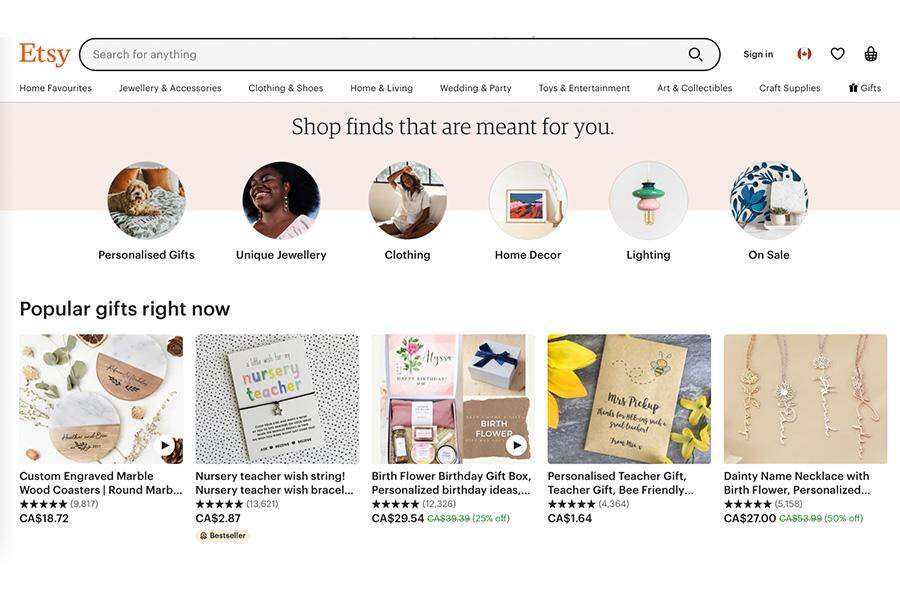
Brief outline of Etsy
Etsy is an online marketplace with several online vendors on its’ storefront.’ All retailers share something in common, their products are artsy and crafty, making the Etsy market fiercely competitive. Etsy’s involvement in the buying process is front and center for your shoppers.
Etsy’s unique twist on the e-commerce industry is the focus on selling unique items that are either hand-crafted or vintage. It clearly works! Etsy has over 1.7 million vendors that sell to more than 33 million buyers worldwide.
Etsy invites independent sellers of any size on their platform. However, it’s often an entry-level shopfront, best suited for new sellers with limited stock and unique items.
Differences between Shopify and Etsy: Choosing the best platform for you
How do you decide which platform is best for you as a small business selling products online?
Here we will look at the major differences between Shopify and Etsy, list some pros and cons, and compare how the platforms operate with regard to shipping, payment options, attracting customers, pricing, and so on.
| Pros | Cons | |
| Shopify | E-commerce tools: Shopify has the best sales tools to manage and grow your business easily.Scalable: Built for all store types and sizes, from small businesses to big brands.Sell unlimited products with no restrictions: With Shopify, there are no rules on the types of products you can sell! | Exposure: Customers need to search for your site specifically. So traffic is dependent on your brand and marketing.Add-ons: Shopify has an app store, which is excellent for customizing your store! But adding apps can increase monthly costs, which could be problematic for small-scale sellers. |
| Etsy | Traffic: Etsy is a marketplace that customers already use, making it easier to be found without having to promote your brand. Ease of use: To start selling, all you have to do is set up an account and then upload product images and information. Cost: Etsy has no monthly charge on the Standard plan. (But, you still have to pay a fee for listing items and transaction fees). | Transaction fees: Etsy’s listing fee is $0.20, and the transaction fee is 5%. In addition, there’s a standard 3% + $0.25 payment processing fee. As sales increase, these fees can start to have a significant impact.Product restrictions: Etsy has strict rules about what you can sell – only handmade goods, craft supplies, and vintage items (over 20 years old).Creative control: Etsy’s marketplace format means you don’t have freedom over the layout or branding of your product pages. |
Ease of use
Ease of use is definitely something to consider when choosing online platforms. Etsy and Shopify are designed to be easy for e-commerce beginners to start selling.
When you sign up for an account with Shopify or Etsy, you’re taken through an onboarding process that guides you through the critical steps needed to start selling. Additionally, online resources and video tutorials are available to support you further.
One major thing to remember when comparing Etsy and Shopify is that you are building an entire website with Shopify. While Shopify does make this process as easy as possible, you will have to consider building a whole brand along with your site.
Design flexibility
Website design makes a big difference in customer experience online. Approximately 38% of people will leave a website if the layout or design is unattractive.
With Etsy, you have very little control over the design of your site. Your store page and product pages will follow Etsy’s design and layout – your store name, logo, and product descriptions are the only things you can control.
This isn’t necessarily a bad thing for two reasons:
- You don’t have to invest much time thinking about the design of your site
- Buyers are expecting a specific type of look and feel from Etsy
That being said, because you are unable to customize your site with Etsy, you aren’t able to stand out as a seller or build a unique brand.
On the other hand, Shopify has a wide range of templates available that are used as your website’s building blocks. These templates can be extensively tweaked through Shopify to match your branding (and via CSS and HTML, if you have the technical skills).
Domain and URL structure
A domain name is the address people type in to find your website, and Shopify encourages businesses to use a custom domain (one you’ve purchased). They also have an automated setup for your domain to make it as easy as possible to get a personalized domain name for your online store.
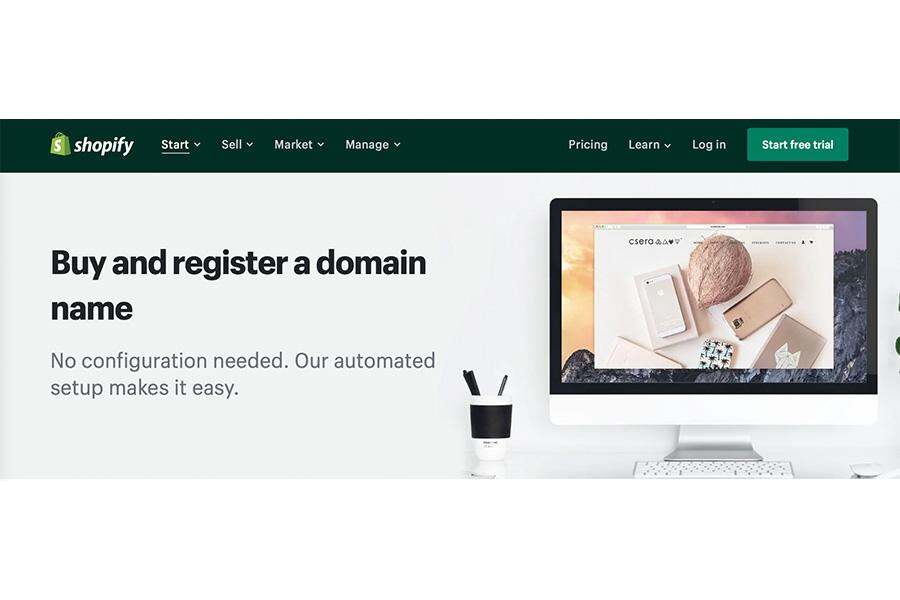
With Etsy, you don’t get a personalized domain name because you’re selling through their marketplace. Instead, your domain will be based on the marketplace domain. Your website domain will look something like this: www.etsy.com/shop/your-store-name-here.
Why do we care about domains? A custom domain helps to create a trustworthy, professional, and recognizable brand for your business. While not having your own custom domain, like with Etsy, isn’t ideal, it doesn’t necessarily matter for individual sellers wishing to keep things small and simple.
Ecommerce tools and site features
Etsy has basic e-commerce features to make managing your shop easy, and the ‘Sell on Etsy App’ helps to stay on top of your store on the go.
The main features that add value to your Etsy experience are easy-to-print and discounted postage and marketing tools. Etsy’s marketing tool helps you to increase your customer base by making it easier to be found online by sharing across platforms, creating coupons, etc.
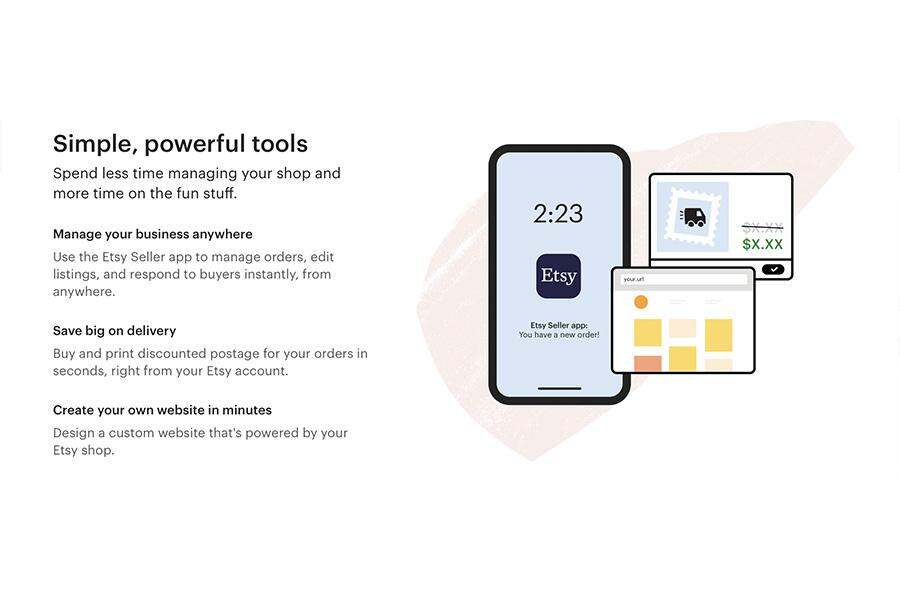
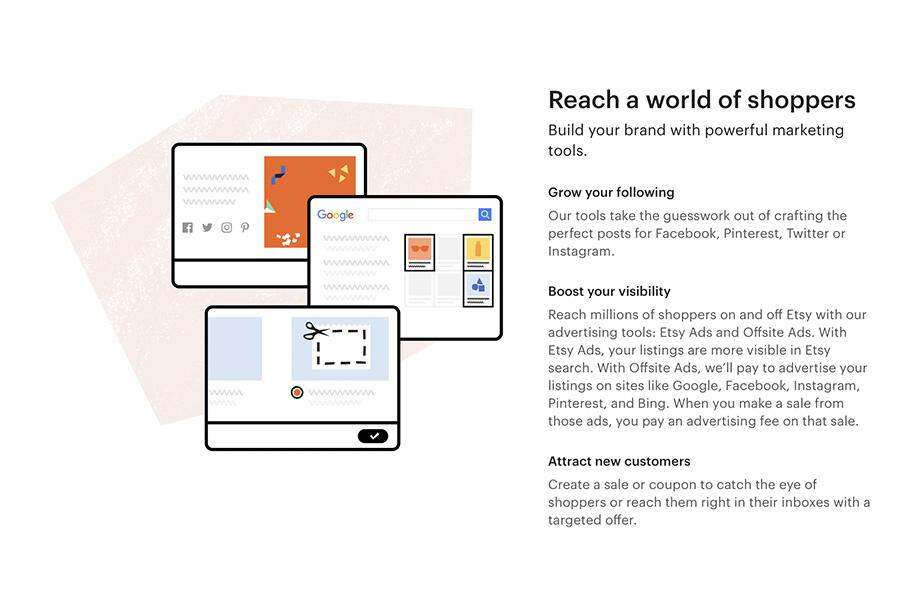
Etsy Plus gives you additional tools:
- Advanced Customization options: banner templates, layout option for featured listings, and the ability to feature specific listings or shop sections
- Discounts on marketing materials: business cards and other printables
- Re-stock Request: Email alerts sent to customers once an item is back in stock
- Advertising credits
Note that because Etsy is marketplace based, your inventory is not included, and you have to keep track of this yourself.
While Etsy’s tools are reasonably good and often enough for small-scale sellers, Shopify’s tools are excellent for all business sizes and types.
Shopify has an extensive app store that gives you ultimate customization and a long list of powerful extras to choose from!
Here are some of the major features with Shopify:
- Multichannel selling across 10 different social platforms
- Discount codes
- Free SSL (Secure Sockets Layer) certificate
- This means your site is safe for visitors to enter their payment details through. This is essential for any online store.
- Abandoned Cart Recovery
- This feature sends emails to customers who have abandoned their products at checkout and encourages them to return. According to research, this can recover 12 to 15% of customers.
- Gift cards
- Third-party calculated shipping rates
- Fraud analysis
- Shopify POS (Point of Sale) app
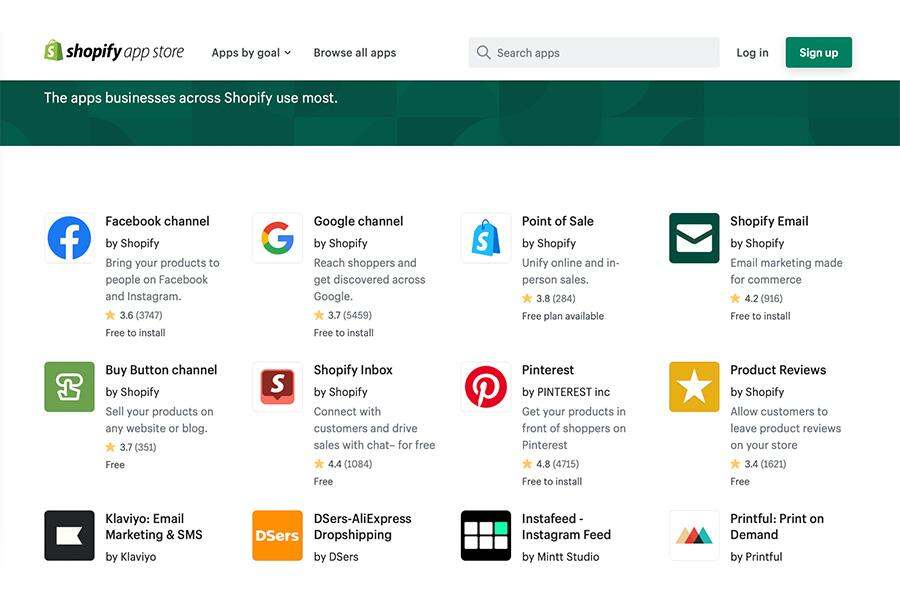
One of Shopify’s best sales features is its inventory system. It provides in-house stock management tools, so tracking and analyzing your sales is easy.
Shipping and dropshipping
Shipping is an important feature to consider when choosing an online platform as it’s essential to get your goods to your buyers quickly and efficiently.
Many Etsy merchants ship their products because they often sell handmade or one-off items. Etsy makes shipping your products easy by allowing you to print postage labels from within the tool. Etsy also offers some generous discounts on postage labels.
If you don’t want to ship your products, you can use a fulfillment service; many of them work directly with Etsy — including Shipstation and Amazon’s popular FBA service. However, you need to sell enough products to justify this option.
Shipping your own goods with Shopify is easy and flexible. You can set your shipping rates and rules based on product weight, price, quantity, and more. Depending on your location, shipping discounts are also available through ‘Shopify Shipping’ — a real-time carrier quotation system.
If you don’t want to fulfill your products yourself, as with Etsy, you can connect your Shopify store to a third-party fulfillment service. Alternatively, you can consider dropshipping.
Dropshipping
What is dropshipping? Dropshipping is a way to sell products where you don’t make, store or fulfill any products. Instead, you take an order via your store, send it to a supplier, and they deliver the goods to your customer.
Given the restrictions on what you can sell on Etsy (handmade items, vintage goods and craft supplies), it’s not surprising it’s not a platform that facilitates dropshipping easily. You can get other businesses to fulfill products sold on Etsy, but only if you have designed them yourself. However, it’s possible to use Printful and Printify in conjunction with Etsy. These dropshipping services manufacture and deliver products based on images and artwork uploaded by you.
If you like the idea of dropshipping, Shopify is a much better solution for this type of online selling — and in many ways, it has been designed with it in mind. With Shopify, you can connect your store directly to many dropshipping apps and source goods from many suppliers, and there’s no significant investment involved.

Payment options and fees
It’s still always a good idea to understand payment options and transaction fees before you sign up for a platform.
As we mentioned, Etsy doesn’t charge monthly fees. However, it does charge listing fees ($0.20 per product) – this is essentially the cost to publish your listing, which is active for four months or until the item is sold. Then, when you sell a product, there is a 5% transaction fee, plus the standard payment processing charge with Etsy is 3%+$0.25.
Etsy’s fees aren’t the cheapest, but if you’re selling on a small scale, they shouldn’t impact you too much. However, if you plan to grow your business, the 5% transaction fee will start to make a more significant impact.
While Shopify does charge a monthly fee (which we will talk about later), depending on the size of your business, it might work out as better value as when it comes to customer payments, Shopify has different payment options to choose from.
Shopify has an in-house payment gateway, Shopify Payments, which doesn’t charge transaction fees – you only pay the payment processing fee, which is 2.2%+20p. (Note this payment processing fee is much less than Etsy).
Your other payment options with Shopify include PayPal, Google Pay, Apple Pay, Stripe, and more. These payment options also have payment processing or transaction fees ranging from 0.5% to 2%.
So comparing the two on payment options and fees, Shopify has much cheaper rates than Etsy.
Attracting customers
With Etsy, you have a ready-made customer base because you’re using their established marketplace. Etsy has 93+ million customers and $3bn USD gross merchandise sales. If you’re selling handmade goods, vintage items or craft supplies, it’s hard to think of a more relevant audience for you.
However, there is no guarantee that a potential buyer will find you among the number of other sellers who are likely to sell similar products. The things to consider when building your store with Etsy to attract customers are:
- Placing your products in the correct niche
- Writing quality product descriptions
- Competitive pricing
With Shopify, you are responsible for your marketing strategy because you have built your website. Some of the things to consider when it comes to marketing your new business include:
- Search engine optimization (SEO) to rank for Google search
- Promoting yourself on social media
- Online advertising
- Content marketing
Shopify provides tools to market yourself, such as SEO apps and guides, email campaigns and multichannel selling across other platforms like Facebook and Instagram, but the responsibility still lies with you.
Although it’s more work to market yourself with Shopify, you’re in complete control of connecting with your customers and creating epic marketing campaigns. You don’t have to wait for visitors to stumble across you.
Help and support
While both sites are exceptionally user-friendly, there are bound to be instances where something will go wrong, and you will need support.
Shopify and Etsy offer customer support over the phone, chat and email. Additionally, various searchable online resources and community forums are supplied to help you learn more about the product.
However, Shopify offers 24/7 support, and you can connect with a real-life live advisor much more quickly.
Pricing
Now that you know more about both platforms, you might be closer to deciding between the two. But, of course, we need to talk about pricing, which could tip the scales for some small businesses or newer entrepreneurs.
Etsy has minimal upfront costs as the Standard plan has no monthly fees. There are only the listing fees, transaction costs, and payment processing charges.
You can upgrade to the Plus plan with Etsy to unlock more features which costs $10 per month but gives you a broader set of tools to help grow your store, such as more customizable options and email alerts.
Shopify has higher upfront costs, ranging from $29 to $299 per month. But, you get what you pay for and unlock more advanced features as you scale up.
Shopify pricing
| Basic Shopify ($29/month) | Shopify ($79/month) | Advanced Shopify ($299/month) |
| Ecommerce website & blogUnlimited products2 staff accounts24/7 supportMultichannel sellingManual order creationDiscount codesFree SSL certificateAbandoned cart recoveryFraud analysisShopify POS AppStandard credit card rates | Everything from Basic Shopify5 staff accountsGift cardsProfessional reportsLower credit card ratesPoint of Sale extras | Everything from Shopify plan15 staff accountsAdvanced report builderThird-party calculated shipping ratesLower credit card rates |
Can you use both Etsy and Shopify?
If you’ve gotten to this point and are still torn between Shopify and Etsy – you can have the best of both worlds!
You can integrate the Etsy marketplace with Shopify using the Shopify App Store. Real-time synchronization ensures you avoid confusion between the two platforms and prevents overselling by syncing both stores whenever you make changes.
This integration is free for seven days, but after that, it costs $60 per month.
This integration is an excellent option if you have a Shopify store and want to diversify your online presence. Integrating with Etsy can reach a new audience and make the most of this popular marketplace.
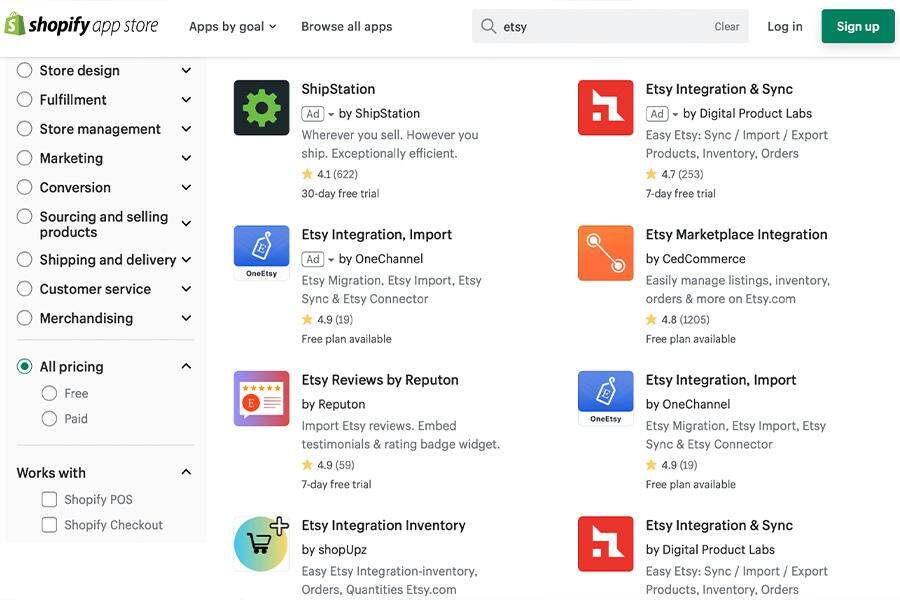
Conclusion: Shopify vs Etsy
Now that you know a lot about both Shopify and Etsy, let’s quickly review what we’ve learned:
- Etsy is a marketplace for handmade products. In contrast, Shopify is an online store builder suitable for any business in any industry.
- Etsy regularly attracts 33 million customers to its established online marketplace. In contrast, Shopify users must build their brand and drive website traffic.
- Etsy doesn’t have a monthly fee, but Shopify becomes more cost-effective once your sales volume increases.
- Shopify is more customizable and lets businesses design their brand. It provides a more versatile toolkit to make these design choices and has more features that Etsy.
- Shopify has 24/7 live chat and phone support.
- Shopify has more payment options which can result in lower fees.
- Etsy has its own marketplace domain, and your store will always be a subdomain. Shopify allows you to use your own custom domain.
So, if you’re simply counting the benefits and functionality, Shopify wins. However, not every business or entrepreneur has the money to invest nearly $30 a month, nor the time to use all the customization and features Shopify offers, especially when they first launch.
Shopify is a scalable platform, so it makes sense to use this solution if you’re a growing or a larger business. But, there are many reasons why a smaller seller might choose Etsy.
When to use Etsy
Etsy is best suited for newer sellers who have a smaller inventory and are selling handcrafter or unique items. If you’re making your own products, chances are you won’t have an extensive catalog, and each piece may be unique. So, Etsy connecting you to a customer base already interested in the types of things you’re creating is a great benefit. Plus, you won’t face any up-front costs to sell your products online. As such, it’s a low-risk model if you’re unsure how well your products will sell.
When to use Shopify
If you’re a growing business with a more substantial inventory, Etsy might not be a good fit. Shopify provides an inventory system that allows you to track and analyze your stock and has numerous other apps and features you may find helpful. Shopify also gives you the freedom to build a brand and market yourself from the convenience of your own web domain.
Shopify is also the best option if you aim to branch out from the arts and crafts niche, as Etsy is quite restrictive.





 Afrikaans
Afrikaans አማርኛ
አማርኛ العربية
العربية বাংলা
বাংলা Nederlands
Nederlands English
English Français
Français Deutsch
Deutsch हिन्दी
हिन्दी Bahasa Indonesia
Bahasa Indonesia Italiano
Italiano 日本語
日本語 한국어
한국어 Bahasa Melayu
Bahasa Melayu മലയാളം
മലയാളം پښتو
پښتو فارسی
فارسی Polski
Polski Português
Português Русский
Русский Español
Español Kiswahili
Kiswahili ไทย
ไทย Türkçe
Türkçe اردو
اردو Tiếng Việt
Tiếng Việt isiXhosa
isiXhosa Zulu
Zulu